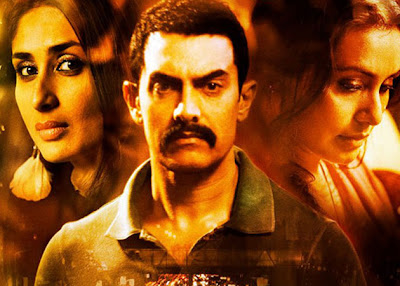Interlaced with this mystery is the inspector's private hell where the recent loss of their only son Karan in a boating accident has driven a wedge between him and his wife Roshni (Rani Mukherjee in superb form). Roshni finds solace in certain seance sessions with her curious neighbor (Shernaz Patel) seeking communication with her son, while Shekhawat wanders around the city at night, sleepless, looking for answers both for the case and for the battle with his own demons. These are all tormented people, living out the tragedies that fate has cruelly dealt on them and this is exactly what makes Talaash such a compelling watch for me. There is reality in their palpable sorrows. When Rosie talks of the miserable fate of her community to Shekhawat, there is a glint of her tragedy and that of her likes.
Talaash to me works in equal measures as a fascinating police investigation, noir mood themed cinema with a little of the otherworld and a story of loss and the process of healing it requires. Director Reema Kagti can take a bow. Walking a fine line, she shows strong hold on a tricky subject lending it with immense grace and maturity. There are no caricatures here, just individuals whose stories need telling. She keeps the movie as real as a subject like this can call for. Aiding her are her tremendous crew of cinematographer Mohanan under whose watchful camera the nocturnal underbelly of Bombay comes alive in its garish colors and seedy streets, Ram Sampath gives music that slinks into the proceedings skillfully giving the film a haunting, almost eerie quality. The soundtrack, in my opinion, is one of the best and most varied Hindi movie tracks in a while. And then there are the words, be it Javed Akhtar's deeply melancholic lyrics or the dialogues by Farhan Akhtar and Anurag Kashyap, everything adds tremendous layers to the tale, underlining nuances and hidden depth.
But the star here is the story by Kagti herself and Zoya Akhtar. The director and her entire team remains true to the tale at hand. Very rarely in recent Indian cinema have I seen so many layers seamlessly integrated together, effortlessly connecting, so many genres brought together rendered with dignity and sensitivity. And now a word for the all important cog in the wheel....the actors. Each performance is authentic. We forget the big stars and what remains are just the characters which are so justifiably performed. Rani Mukherjee, stripped of make up and mannerisms, portrays her grief through those achingly sad eyes. Kareena Kapoor brings a playfulness mixed with haunting sadness to her Rosy, when those merry eyes betray a hint of doom. When she soothes Shekhawat's tired soul with her touch putting him to long robbed sleep, in one of the movies highlight sequences, those eyes and expressions contain so much depth. And now to the knockout performance that Nawazuddin gives with his Tehmur. My ravings will not do it justice. In the role of the luckless lame son of a prostitute doing odd jobs for the pimp who grabs that one chance destiny dangles and gets swept into a quagmire of his own making, there is not a single misstep. He also owns the single thrilling chase sequence towards the climax which is a treat to witness.
Reining all the performances together with his central to the plot character of Shekhawat, Aamir Khan is superlative. His pain and angst is all internalised, the stoic, stern and dutiful cop/husband is at the forefront. The nights that he is awake, replaying the happenings leading to his son's demise, playing out all the different 'what if' scenarios that could have prevented the tragedy is palpable and rings true. His catharsis at the end when he finally gives in to that pent up grief is a relief to the audience. Each of the characters big or small, are so real that we care for them, invest in them. A special mention to Shekhawat's subordinate Devrath played by Raj kumar Yadav. He is effortless, watch his background reactions in the one big confrontation between Shekhawat and his wife Roshni.
And while I have so many thoughts I still feel the need to share of this multilayered mystery/drama, the fact is many of its audience looking for a conventional thriller might come away disappointed. Kagti lays out the cards honestly and doesnt throw any red herrings at us, giving us an equal chance to guess the mystery. The real beauty of this movie is not in playing the guessing game, but to sit back and realize how skillfully Kagti has brought the plot together and tied it up, leaving no loose ends. And while one would remember some so called Hollywood lifts thematically for the mystery, that concept has existed from eons in different forms and not just in the West. Our heritage is rich with such myths and lores as well. To weave such a humane drama around it, is what we can safely salute the movie makers for. It is easily one of my favorite movies of the year. I went in expecting a mystery and I came out with so much more.
Release in 2012
In Hindi with English subtitles
My Rating: 4.5/5






